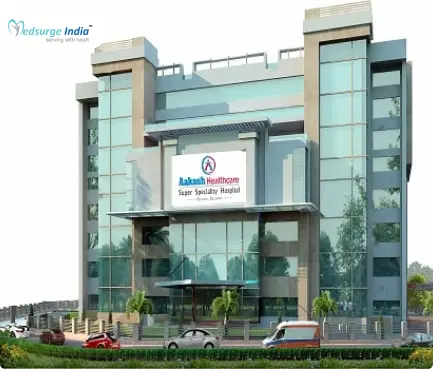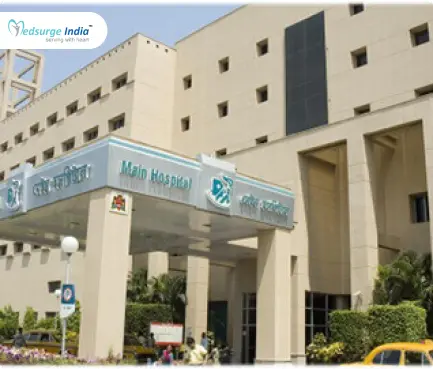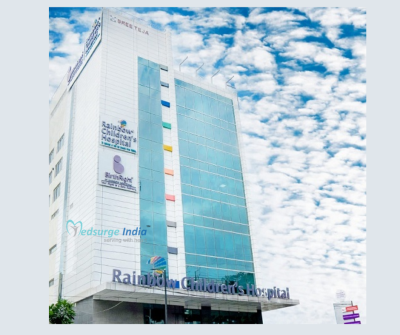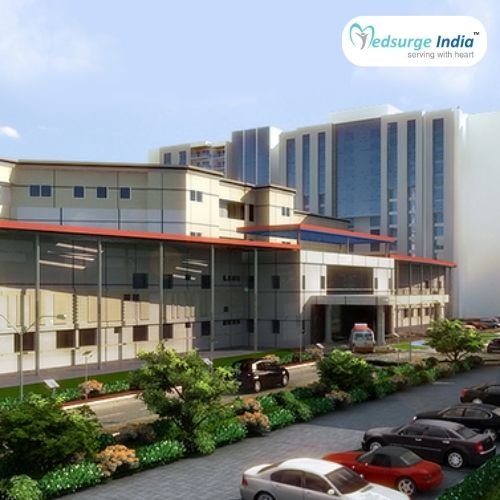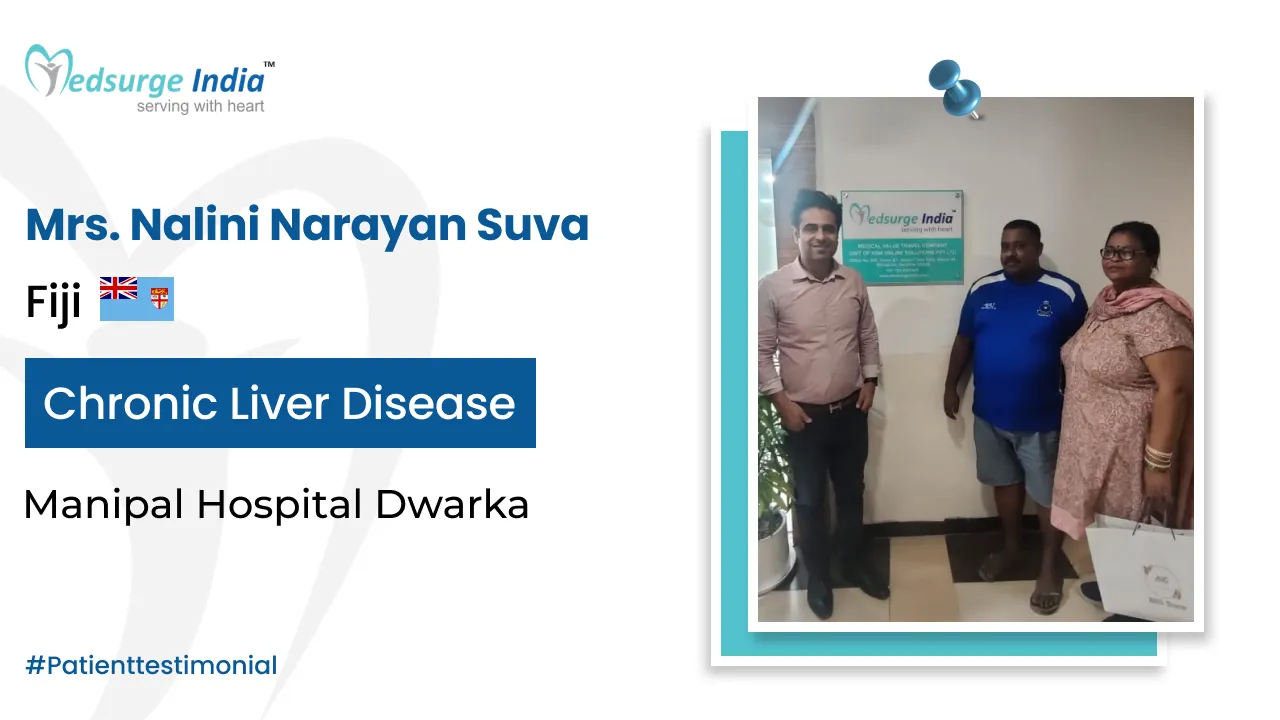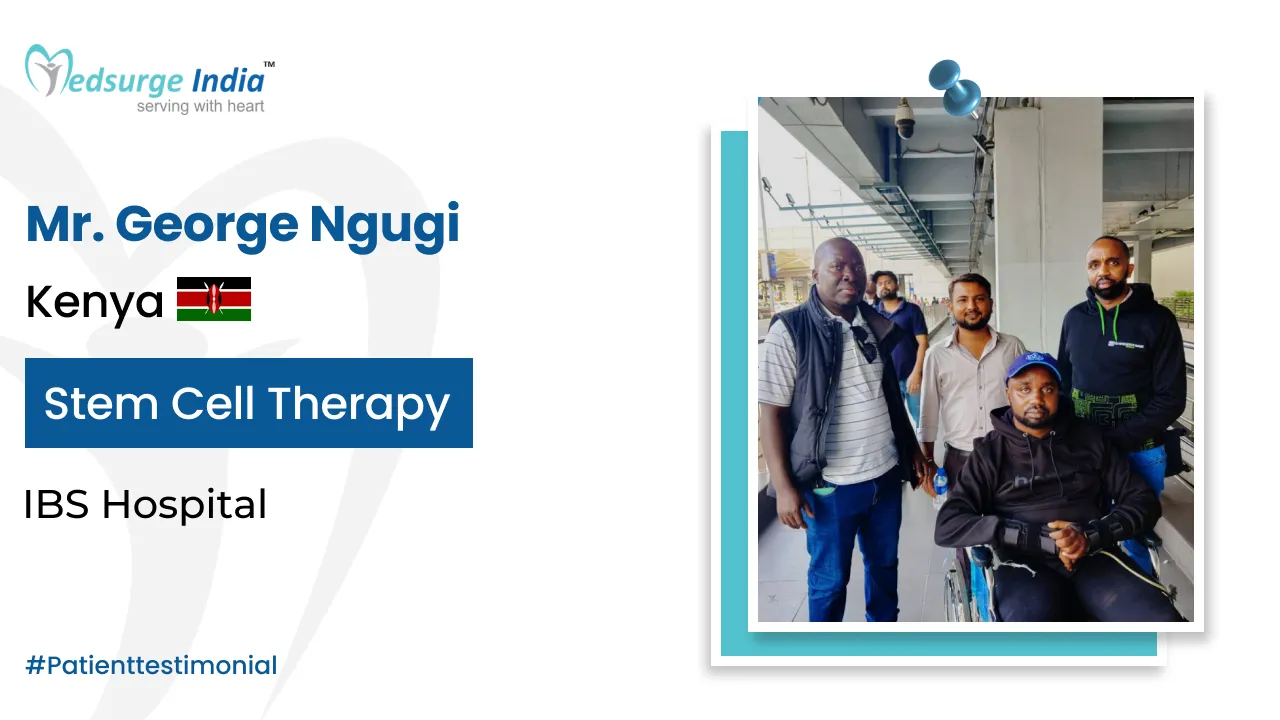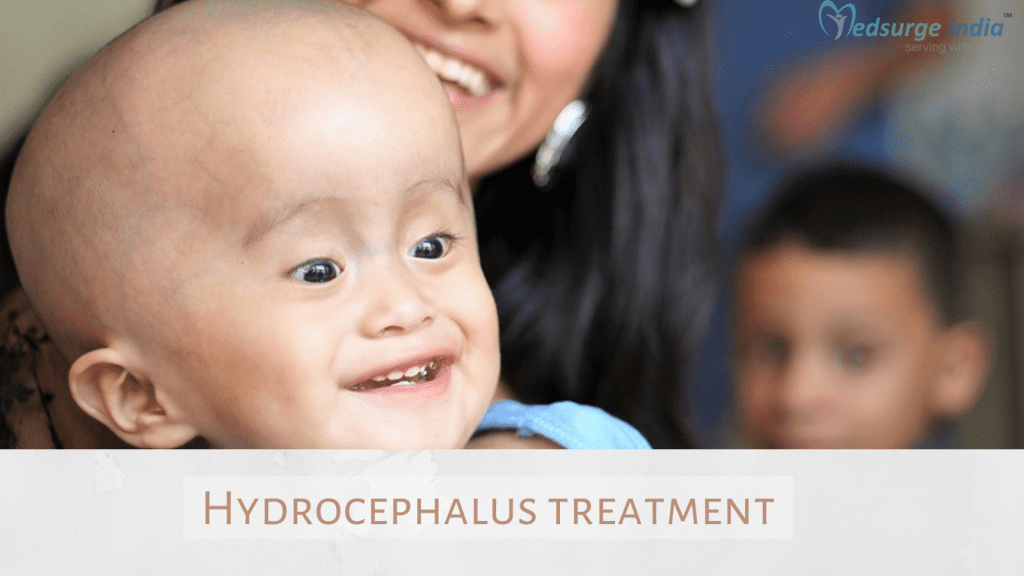
Hydrocephalus is the excessive accumulation of cerebrospinal fluid (CSF) within the ventricles of your brain. This extra fluid causes your ventricles to dilate, putting harmful pressure on your brain’s tissues. There is currently no cure for hydrocephalus, but it can be treated. For hydrocephalus treatment in India, immediate CSF fluid drainage is arranged by surgically inserting a tube or shunt to drain out the excess fluid. This tube is monitored until the symptoms subside, and the patient is regularly monitored. Diuretic medications are administered to help flush out the excess fluid.
Hydrocephalus treatment cost in India is less expensive than in other countries such as the United States and Europe. Indian hospitals provide affordable healthcare packages with the assurance of excellent treatment quality.
What Is Hydrocephalus?
The abnormal buildup of fluid within your brain is known as hydrocephalus. The term “hydrocephalus” is derived from the Greek words “hydro” (water) and “cephalus” (head). Hydrocephalus was previously referred to as “water on the brain.” Cerebrospinal fluid” (CSF) is a clear, colorless fluid that surrounds your brain and spinal cord.
CSF normally flows through the ventricles in your brain. CSF acts as nutrient delivery and waste removal system for your brain. CSF bathes your brain and spinal cord, protecting and cushioning them from injury. CSF is then reabsorbed into your bloodstream.
Every day, your body produces the CSF it requires and then reabsorbs the same amount. When the normal flow or absorption of CSF is blocked, however, a buildup of CSF can occur. As the CSF accumulates, the ventricles enlarge. This increases the pressure inside your head. Too much CSF pressure can prevent your brain from functioning normally.
The following are the four main types of hydrocephalus:
- Communicating hydrocephalus
- Non-communicating hydrocephalus
- Normal pressure hydrocephalus (NPH)
- Hydrocephalus ex-vacuo
What Are the Signs and Symptoms of Hydrocephalus?
Because hydrocephalus can occur at any age, the symptoms are classified based on the age of onset.
Symptoms of Hydrocephalus in Infants:
- The unusually large size of the head
- An increasing circumference of the head
- Soft spot or bulging and tense fontanelle
- Prominently visible veins in the scalp
- Downward deviation of eyes (sunset sign)
- Irritability
- Sleepiness
- Seizures
Symptoms of Hydrocephalus in Children and Adolescents:
- Nausea and vomiting
- Optical disc swelling (papilledema)
- Blurred or double vision are examples of vision problems.
- Developmental progress that is slow or delayed
- Personality transitions and Loss of the ability to concentrate
- Problems with gait and balance
- Appetite loss
- Seizures
- Incontinence of the bladder
Symptoms of Hydrocephalus in Adults:
- Nausea and vomiting
- Headache
- Walking or gait balance issues
- Coordination issues
- Fatigue
- Vision difficulties
- Incontinence of the bladder
- Cognitive skills difficulties
- Memory loss
- Dementia (mild)
What Exactly Causes Hydrocephalus?
Hydrocephalus can occur for a variety of reasons:
- Congenital hydrocephalus
- Acquired hydrocephalus
A combination of genetic and environmental factors during fetal development causes congenital hydrocephalus. “Congenital” means present at birth. The most common causes of congenital hydrocephalus are:
- Spina bifida and other defects of the brain and spinal cord (neural tube).
- A narrowing of the small passageway between your brain’s third and fourth ventricles (aqueductal stenosis).
- Premature birth complications, such as bleeding within the ventricles.
- Infections that can cause inflammation in fetal brain tissue during pregnancy, such as rubella.
Acquired hydrocephalus can occur at any time after birth and affect people of any age. The following are the most common causes of acquired hydrocephalus:
- Trauma to the head.
- Stroke.
- Tumors of the brain or spinal cord.
- Meningitis or other brain or spinal cord infections.
- Furthermore, hemorrhage or surgical complications can result in normal pressure hydrocephalus. Many people develop NPH for no apparent reason.
Hydrocephalus Treatment Cost In India
The average Hydrocephalus Treatment Cost in India starts from USD 3,000. The treatment price will vary for Hydrocephalus Treatment Cost in India according to various factors.
Types of Treatment Prices for Hydrocephalus Treatment Cost in India
| Treatment | Starting Price |
| VP Shunt Surgery | USD 4,000 |
| Endoscopic third ventriculostomy (ETV) | USD 4,500 |
Hydrocephalus Treatment Cost in Different Parts of India
| Cities | Starting Price |
| Delhi | USD 3,000 |
| Gurgaon | USD 3,000 |
| Noida | USD 3,000 |
| Mumbai | USD 3,200 |
| Hyderabad | USD 3,000 |
| Chennai | USD 3,000 |
| Kolkata | USD 3,000 |
| Bangalore | USD 3,200 |
Please keep in mind that prices of Hydrocephalus Treatment Cost in India will vary depending on various factors.
Factors That Can Affect Hydrocephalus Treatment Cost in India
The following here are some variables that can affect Hydrocephalus Treatment Cost in India:
- Medication costs.
- Duration of treatment.
- Geographical location.
- Hospitalization expenses.
- Government policies and subsidies.
- Medical tourism packages.
- Hospital reputation and infrastructure.
- The expertise and experience of medical professionals.
- The type and frequency of diagnostic procedures.
- The choice of treatment modality.
The standard and grade of medical care and amenities are comparable to those of the most prestigious healthcare facilities in the world, even when the expense of lodging, meals, and transportation is taken out. Under the direction of the most skilled physicians, Medsurge India provides patients with the lowest Hydrocephalus Treatment Cost in India.
How is Hydrocephalus Diagnosed?
A neurological examination is used to diagnose hydrocephalus. Your doctor may employ brain imaging techniques such as ultrasounds, computer tomography (CT), or magnetic resonance imaging (MRI).
Other tests are frequently used to diagnose the condition in adults. Among these tests are:
- Spinal fusion (lumbar puncture).
- Intracranial pressure monitoring (ICP), measures pressure with a small pressure monitor inserted into your brain.
- Fundoscopic examination, in which a special device is used to view the optic nerve at the back of your eye.
Imaging of the brain –
Imaging tests that can aid in the diagnosis of hydrocephalus and the identification of underlying causes of symptoms include:
- Ultrasound
- MRI
- CT scan
CT scanning generates less detailed images than MRI and exposes the patient to a small amount of radiation. CT scans for hydrocephalus are typically reserved for emergency situations.
Helpful – Brain Haemorrhage Surgery Cost in India
Get Free Cost Estimation
Procedure
What Are the Treatment Options for Hydrocephalus Patients?
There is currently no cure for hydrocephalus. Surgery can be used to redirect the flow of fluid and relieve pressure buildup in the brain. There are two types of hydrocephalus surgery in India available:
- VP Shunt Surgery: The most common type of surgery for the treatment of hydrocephalus. A ventriculoperitoneal shunt is a surgical procedure that involves the placement of a shunt (VP shunt). A shunt is a soft, flexible tube-shaped medical device. The top end of the shunt is inserted into the ventricle inside the brain, and the tube is tunneled beneath the skin to a place in the body where the fluid can be absorbed, such as the stomach or heart chamber. A valve is attached to the tube, which helps control the flow of cerebrospinal fluid through the shunt device.
- Endoscopic third ventriculostomy (ETV): It is a procedure that is being considered as an alternative to VP shunt surgery. Instead of inserting a tube shunt, an endoscopic third ventriculostomy (ETV) creates a hole in the brain’s floor to allow excess CSF to drain to the brain’s surface. After that, the fluid can be absorbed.
This surgery, however, is not appropriate for every patient. It is a treatment option for people who have CSF buildup in their brains as a result of a blockage (a condition known as obstructive hydrocephalus). The goal is to drain the excess fluid through the hole and avoid clogging.
The cost of hydrocephalus surgery in India is determined by several factors, including –
- The condition’s severity
- The hospital’s location and accreditations were chosen.
- Experience as a surgeon
- Duration of hospital stay
- Room type
- Whether any additional procedures are needed
What Are the Complications of Hydrocephalus Surgery?
Many people live without complications for decades, but things can change quickly. People who have shunts must have regular medical exams. Shunts can fail, break, or become infected. If this occurs, another brain surgery will be required. An ETV can fail at any time, putting a person in danger.
If you develop symptoms of shunt failure or EVT closure, contact your healthcare provider. These symptoms may be similar to those associated with hydrocephalus, such as:
- Headache
- Vision issues
- Vomiting or nausea
- Feeling tired
Or new symptoms like:
- Muscle pain in your neck or shoulders
- Seizures
- Tenderness or redness along the shunt area
- A low-grade fever
Suggestion
Many people with hydrocephalus can live normal lives after surgery and monitoring. However, the condition and complications of surgery can vary greatly between people. It is essential to collaborate with your healthcare provider in order to receive the care you require.
Hydrocephalus is a unique risk to children’s cognitive and physical development. To ensure a positive outcome, parents of children with hydrocephalus should consult with their healthcare providers.
It can be frightening to learn that someone you care about has hydrocephalus. But keep in mind that you are not alone. Your healthcare provider can provide you with the tools and resources you require to care for your family. Your loved one can realize their dreams of living a normal, happy life if they stay informed and plan appropriately.
How Can Medsurge India Help?
Medsurge India is a prestigious support system for patients looking for doctors, hospitals, and specialized treatments. We’ll find the most suitable medical options for you. Regarding your medical issues, our team will give you a list of certified, reputable, and trusted doctors and hospitals. Additionally, we offer a treatment strategy that fits your budget. Apart, we assist patients with obtaining travel authorizations, medical visas, and a multitude of other things.
The Most Important Frequently Asked Questions
Q: Can Hydrocephalus Be Permanently Cured?
A: Hydrocephalus is a long-term condition. It can be managed, but it is rarely cured. However, with appropriate early treatment, many people with hydrocephalus can live normal lives with few limitations.
Q: Is It Possible to Treat Hydrocephalus Without Surgery?
A: Hydrocephalus is a disorder in which cerebrospinal fluid (CSF) accumulates abnormally in the brain. There is no current prevention or cure, but it can be managed surgically.
Q: What Medicines Treat Hydrocephalus?
A: In neonates, acetazolamide (ACZ) and furosemide (FUR) are used to treat posthemorrhagic hydrocephalus. Both are diuretics that appear to reduce CSF secretion at the choroid plexus level. ACZ can be used on its own or in combination with FUR.
Q: Can You Lead a Normal Life If You Have Hydrocephalus?
A: Hydrocephalus can be fatal if left untreated. Early detection and treatment improve the chances of a full recovery. Many people with hydrocephalus live relatively normal lives thanks to the benefits of surgery, rehabilitative therapies, and educational interventions.
Q: Does Hydrocephalus Affect Memory?
A: Frontal lobe symptoms, such as psychomotor slowing and impairment of attention, working memory, verbal fluency, and executive function, are the most common cognitive impairment in patients with idiopathic normal pressure hydrocephalus (iNPH).
Top Hospitals for Hydrocephalus Treatment in India
Top Doctors for Oncology and Oncosurgery
Dr Santanu Acharyya
Consultant
Experience: years of experience
Apollo Gleneagles Hospital, Kolkata
Kolkata, India
Dr. Deepak Gupta
Consultant
Experience: 8 years of experience
Medanta – The Medicity, Gurgaon
Gurgaon, India
Dr Sivaram G
Consultant
Experience: 18 years of experience
Apollo Cancer Hospital, Chennai
Chennai, India
Dr. Ashok Kumar Singh
Consultant
Experience: 10 years of experience
Max Super Speciality Hospital, Patparganj, New Delhi
New Delhi, India
Dr. Sanjeev Bansal
Experience: 19+ years of experience
Max Super Speciality Hospital Bathinda
Bathinda, India
Dr. Rashmi Shukla
Associate Consultant
Experience: 16 years of experience
Max Super Speciality Hospital, Patparganj, New Delhi
New Delhi, India
Dr. Rajeev Saini
Senior Consultant
Experience: 14+ years of experience
Shri Mata Vaishno Devi Narayana Multispeciality Clinic, Jammu
Jammu, India
Dr. Bala Chandran TG
Senior Consultant
Experience: 42 years of experience
Apollo Hospitals, Greams Road, Chennai
Chennai, India
Dr. Aadesh. A. Patil
Consultant
Experience: 15 years of experience
Dr. L H Hiranandani Hospital, Mumbai
Mumbai, India
Dr. Harsha Doddihal
Consultant
Experience: 15 years of experience
Fortis Hospital, Bangalore (Bannerghatta Road)
Bangalore, India
Dr. Nipun Saha
Consultant
Experience: 12 years of experience
Apollo Gleneagles Hospital Kolkata
Mumbai, India
Dr. Runu Sharma
Experience: 15+ years of experience
Max Super Speciality Hospital Dehradun
Dehradun, India




